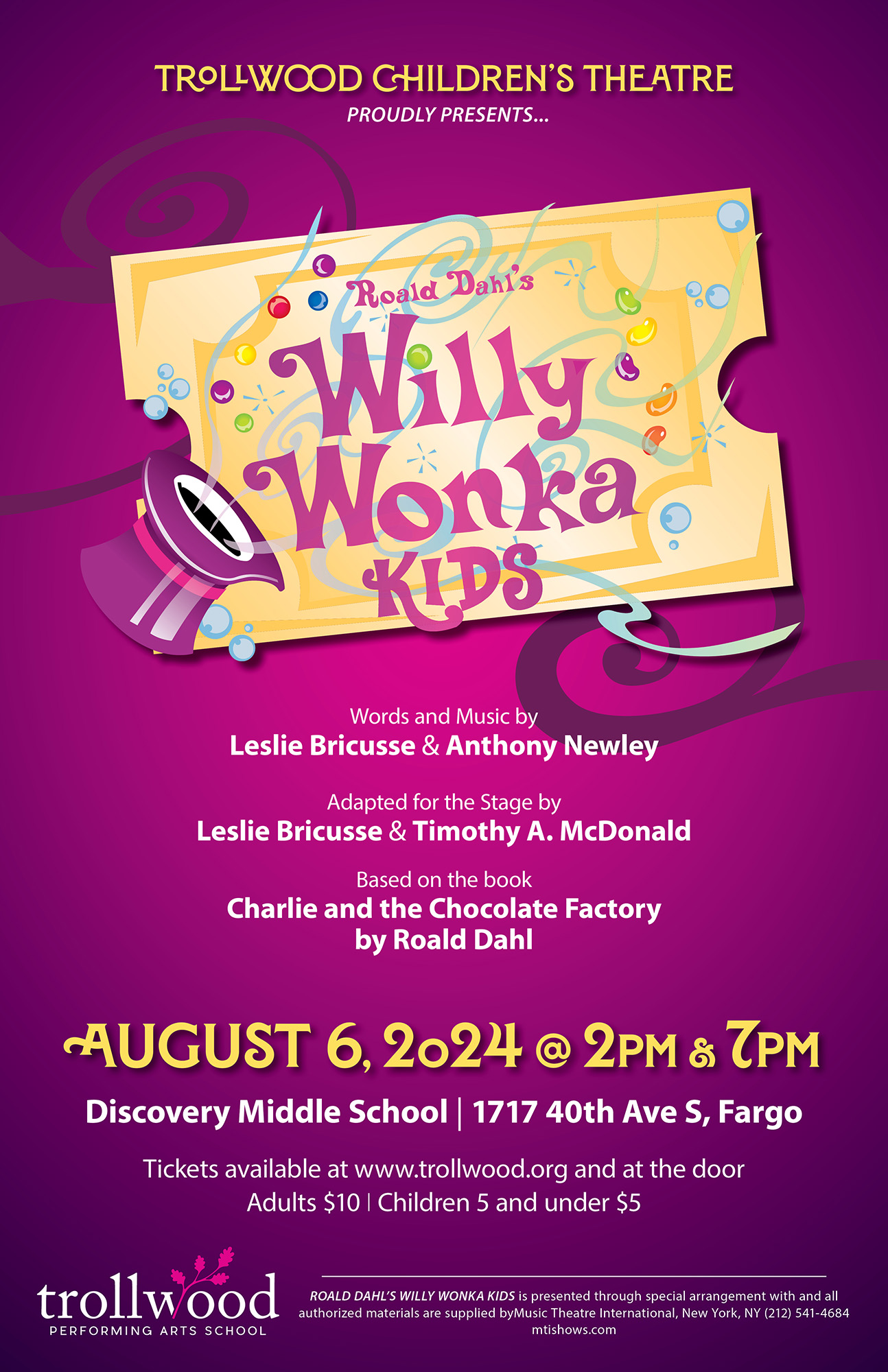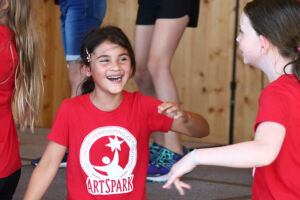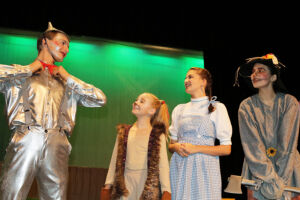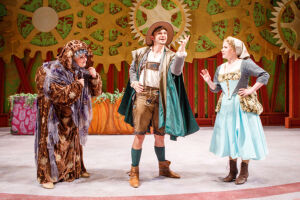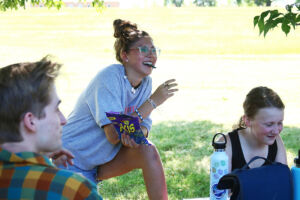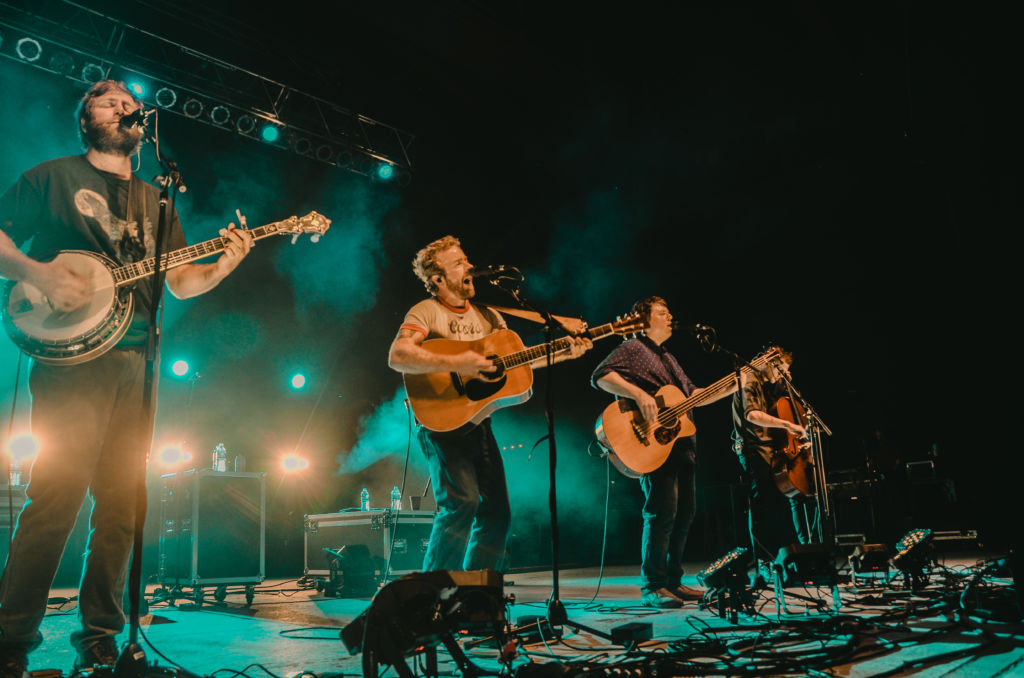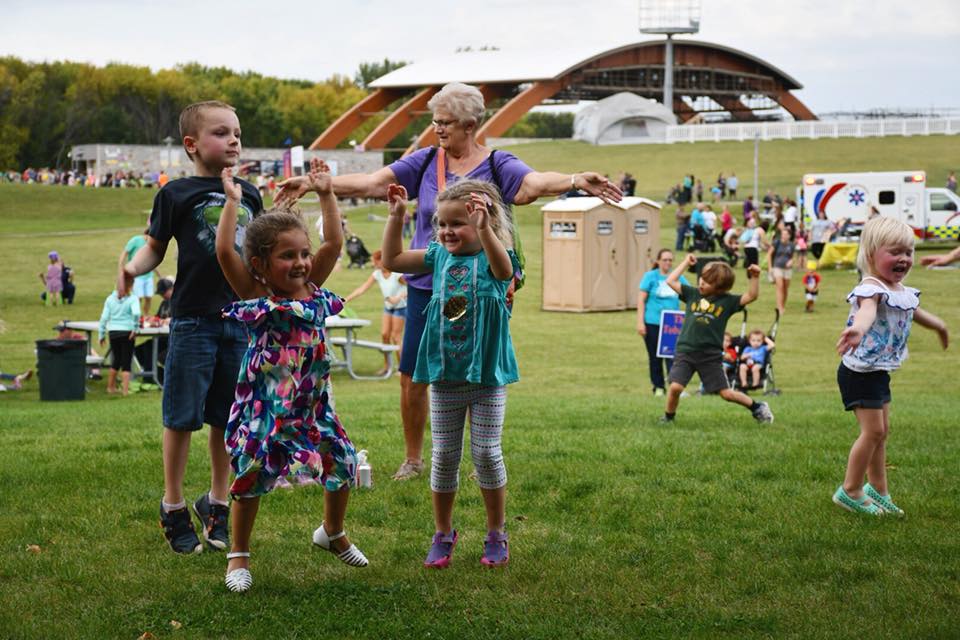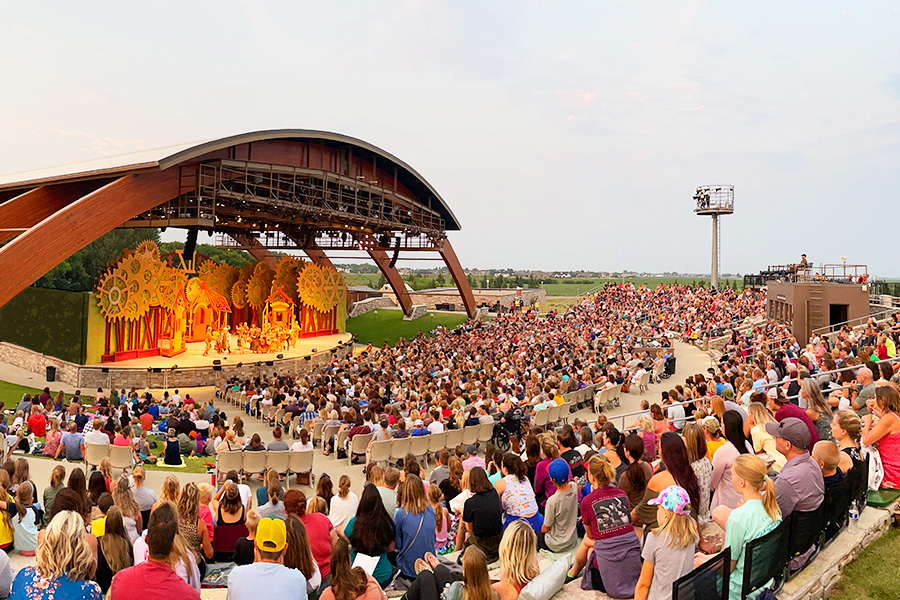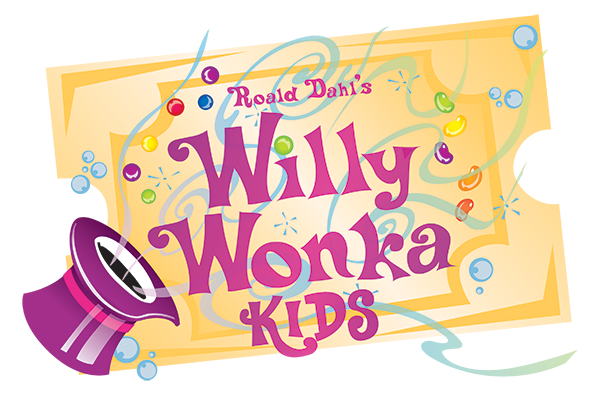2024 Summer Registration has ended, thanks to all who participated!
This program has filled!
please email scharmm@fargo.k12.nd.us if you would like to be put on a waitlist.
Shine Onstage in the
Trollwood Children’s Theatre Production of
Willy Wonka Kids!
Trollwood Children’s Theatre offers 5th and 6th grade students a summer opportunity to be onstage performers, experience theatre, and gain confidence. This four-week, theatre program involves students in the creation and public presentation of a full-fledged children’s musical where students are the cast and crew. This year’s selection is the family favorite Willy Wonka Kids! Theatre and elementary education professionals guide the students through this exciting creative process.
Grades: 5th & 6th (all grades refer to 2023-2024 school year)
Dates: July 15 – August 6, Monday – Friday
Time: 8:00am – 12:00pm
Location: Discovery Middle School, 1717 40th Ave S, Fargo
Auditions: Auditions will be held the first day of class for role assignment only.
Performances: August 6th at 2:00pm and 7:00pm, Discovery Middle School
Fee: See Program Fees page here
Roald Dahl’s Willy Wonka KIDS
The delicious adventures experienced by Charlie Bucket on his visit to Willy Wonka’s mysterious chocolate factory light up the stage in this captivating adaptation of Roald Dahl’s fantastical tale. Featuring the enchanting songs from the 1971 film starring Gene Wilder, in addition to a host of fun new songs, Roald Dahl’s Willy Wonka KIDS is a scrumdidilyumptious musical guaranteed to delight everyone’s sweet tooth.
Roald Dahl’s Willy Wonka KIDS follows enigmatic candy manufacturer Willy Wonka as he stages a contest by hiding golden tickets in five of his scrumptious candy bars. Whomever comes up with these tickets will win a free tour of the Wonka factory, as well as a lifetime supply of candy. Four of the five winning children are insufferable brats, but the fifth is a likeable young lad named Charlie Bucket, who takes the tour in the company of his equally amiable grandfather. The children must learn to follow Mr. Wonka’s rules in the factory — or suffer the consequences. This timeless story of the world-famous candy man and his quest to find an heir is a golden ticket to adventure!
Show synopsis courtesy of Music Theatre International
ROALD DAHL’S WILLY WONKA KIDS
is presented through special arrangement with Music Theatre International (MTI).
All authorized performance materials are also supplied by MTI.
www.MTIShows.com
Trollwood Children’s Theatre Artistic Team to be announced soon!
This page will be used during the program to keep parents and students updated!
Trollwood Children’s Theatre
Trollwood Children’s Theatre introduces 5th & 6th grade students to the performing arts in three curricular areas: Vocal Music, Drama, and Dance. The applicable standards and benchmarks for this program are listed below. Not all standards and benchmarks will be addressed in this session, but a significant number of them will be represented.
MUSIC
Standard 1: Singing
Students sing, alone and with others, a varied repertoire of music.
K-5.1.1. Sing independently on pitch and in rhythm.
K-5.1.2. Sing expressively.
K-5.1.3. Sing from memory a varied repertoire of songs representing genres and styles from diverse cultures.
K-5.1.4. Sing in parts.
K-5.1.5. Sing in groups.
Standard 2: Instrumental Performance
Students perform on instruments, alone and with others, a varied repertoire of music.
*This standard is not applicable in Trollwood Children’s Theatre.
Standard 3: Improvisation
Students improvise melodies, variations, and accompaniments.
K-5.3.1. Students improvise simple melodies, rhythmic and melodic variations, and accompaniments.
Standard 4: Composition
Students compose and arrange music within specified guidelines.
*This standard is not applicable in Trollwood Children’s Theatre.
Standard 5: Reading Music
Students read and notate music.
K-5.5.1. Read simple rhythms in basic meters.
K-5.5.2. Know how to use a system to read simple pitch notation.
K-5.5.3. Know symbols and traditional terms.
K-5.5.4. Know how to use basic symbols to notate music.
Standard 6: Listening
Students listen to, analyze, and describe music.
K-5.6.1. Know simple music forms when presented aurally.
K-5.6.2. Know a variety of styles representing diverse cultures.
K-5.6.3. Know terminology to describe music.
K-5.6.4. Know the sounds of a variety of instruments and voices for various cultures.
K-5.6.5. Understand the relationship between music and movement.
Standard 7: Evaluating Music
Students evaluate music and music performances.
K-5.7.1. Develop appropriate criteria to evaluate performances and compositions.
K-5.7.2. Understand how to use music terminology to express personal preferences for specific musical works and styles.
Standard 8: Music and Other Disciplines
Students understand the relationship between music, the other arts, and other disciplines.
K-5.8.1. Develop appropriate criteria to evaluate performances and compositions.
K-5.8.2. Understand the interrelationship of music and other disciplines.
Standard 9: Music, History, and Culture
Students understand music in relation to history and culture.
K-5.9.1. Know music from various historical periods.
K-5.9.2. Know how elements of music are used in music examples from various cultures.
K-5.9.3. Know various uses of music in daily experiences.
K-5.9.4. Know characteristics that make certain music suitable for its use.
K-5.9.5. Understand the role of musicians in various music settings and cultures.
K-5.9.6. Know appropriate audience behavior for the context and style of music performed.
DRAMA
Standard 1: Dramatic Literature
Students comprehend a wide variety of dramatic literature.
K-5.1.1. Know published and non-published fiction and nonfiction.
K-5.1.2. Understand scripting.
K-5.1.3. Understand the emotional reactions created by dramatic presentations.
Standard 2: Acting
Students will engage in fundamental acting skills.
K-5.2.1.Use a variety of movement, vocal pitch, tempo, and tone.
K-5.2.2. Understand the relationship between character and movement, vocal pitch, tempo, and tone.
K-5.2.3. Create and sustain a character.
Standard 3: Production
Students engage in fundamental production skills.
K-5.3.1. Know how visual elements and aural aspects are used to communicate.
K-5.3.2. Select materials to create technical elements of production.
K-5.3.3. Create marketing and publicity materials.
Standard 4: Cultural Context of Drama
Students will understand the cultural context of drama.
K-5.4.1. Recognize similarities and differences between theatre and one’s own life.
K-5.4.2. Use dramatization to understand culture.
Standard 5: Consumer of Theatre
Students will understand how to be knowledgeable consumers of theatre.
K-5.5.1. Know appropriate audience behaviors.
K-5.5.2. Know that people react to theatrical productions in different ways.
Standard 6: Drama and Human Development
Students understand the role of theatre in human development.
K-5.6.1. Use drama to develop creative thinking skills.
K-5.6.2. Use drama to develop critical thinking skills.
K-5.6.3. Use drama to develop social skills.
Standard 7: Drama and Other Disciplines
Students understand the connections between drama and other disciplines.
K-5.7.1. Know connections between drama and other disciplines in the curriculum.
K-5.7.2. Know how to use drama to demonstrate knowledge of other disciplines.
DANCE
Standard 1: Movement Skills
Students demonstrate proficiency in motor skills and movement patterns needed to perform a variety of physical activities.
K-5.1.1. Use dance elements to expand movement experiences.
K-5.1.2. Know boundaries of dance space.
K-5.1.3. Understand characteristics of nonlocomotor/axial movements.
K-5.1.4. Understand the characteristics of locomotor movements in many directions and pathways.
K-5.1.5. Move to a rhythmic accompaniment and respond to changes in tempo.
K-5.1.6. Understand the characteristics of balance and proper alignment.
K-5.1.7. Understand how body parts and joints are used in movement.
K-5.1.8. Use kinesthetic awareness, concentration, and focus in performing movement skills.
Standard 2: Choreography
Students understand choreographic principles, processes, and structures.
K-5.2.1. Understand the characteristics of a movement sequence.
K-5.2.2. Understand how improvisation is used to discover and invent movement.
K-5.2.3. Understand the characteristics of a dance phrase that is repeated and/or varied.
K-5.2.4. Know how to use the characteristics of solo and group dance to create whole compositions.
Standard 3: Dance and Meaning
Students understand dance as a way to create and communicate meaning.
K-5.3.1. Communicate ideas using movement.
K-5.3.2. Know how dance is similar to and different from other forms of movement.
Standard 4: Dance and Thinking Skills
Students apply critical and creative thinking skills in dance.
K-5.4.1. Know that a variety of strategies can be used to solve movement problems.
K-5.4.2. Understand how various dance styles are similar to and different from one another.
Standard 5: Dance, History, and Culture
Students understand the historical development of dance and its relationship to various cultures.
K-5.5.1. Know the characteristics of multicultural dance forms.
K-5.5.2. Understand the role and purpose of dance in various cultures.
K-5.5.3. Know characteristics of the forms of theatre dance.
K-5.5.4. Know and apply proper audience etiquette.
K-5.5.5. Know dances unique to local geographic regions.
Standard 6: Dance and Personal Wellness
Students understand the connection between dance and personal wellness.
K-5.6.1. Know healthy practices that enhance the ability to dance.
K-5.6.2. Understand the importance of warming up and cooling down the body.
Standard 7: Dance and Other Disciplines
Students understand the difference between dance and other disciplines.
K-5.7.1. Know how to use dance concepts to enhance understanding of other academic disciplines.
